
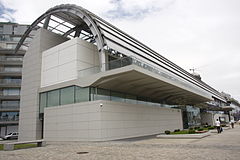
The Amalia Lacroze de Fortabat Art Collection is a museum of fine arts in Buenos Aires, Argentina.


The Amalia Lacroze de Fortabat Art Collection is a museum of fine arts in Buenos Aires, Argentina.
The museum was initiated by María Amalia Lacroze de Fortabat, the longtime chairperson and chief stockholder of Loma Negra, the largest cement manufacturer in Argentina. She set aside a significant portion of her extensive art collection for the purpose, and her foundation contracted internationally acclaimed, Uruguayan born architect Rafael Viñoly for its design.
The building, a two-story modernist concrete, steel and glass structure, began construction in 2002 and provides over 6,000 square metres (65,000 sq ft) of indoor space. Built overlooking the northernmost dock in the Puerto Madero district, among its highlights include a roof with a system of mobile aluminum awnings that open and close with the sun's position. Mrs. Fortabat specifically requested this last design feature, remarking that "I've always wanted to look at pictures and the stars at the same time." [1]
The museum was inaugurated on October 22, 2008, and includes two exhibition halls, a library, an auditorium, offices and a cafe-restaurant overlooking the renovated Puerto Madero docklands. Its two exhibition halls house a collection of 230 works (at the opening date) and are divided into seven galleries: [2]


Belgrano is a northern and leafy barrio or neighborhood of Buenos Aires, Argentina.

Puerto Madero, also known within the urban planning community as the Puerto Madero Waterfront, is a barrio of Buenos Aires in the Central Business District. Occupying a significant portion of the Río de la Plata riverbank, it is the site for several high-rise buildings and luxurious hotels, featuring the latest architectural trends. It is the barrio with by far the highest property price, surpassing the second-highest twofold.

Colegiales is a barrio or district in Buenos Aires, Argentina. It is located between Alvarez Thomas av., Forest av., De los Incas av., Virrey del Pino st., Cabildo av., Jorge Newbery st., Crámer st. and Dorrego av. This neighborhood offers a vast amount of contrast and opportunities.
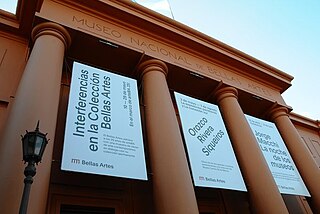
The National Museum of Fine Arts is an Argentine art museum in Buenos Aires, located in the Recoleta section of the city. The Museum inaugurated a branch in Neuquén in 2004. The museum hosts works by Goya, Rembrandt, Van Gogh, Rodin, Manet and Chagall among other artists.
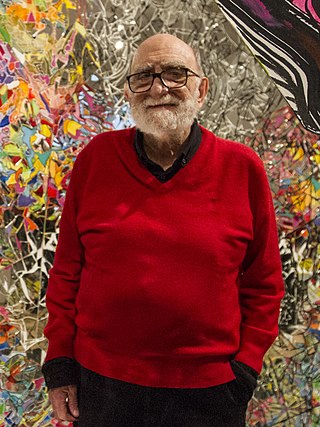
Luis Felipe Noé is an Argentine artist, writer, intellectual and teacher. He is known in his home country as Yuyo. In 1961 he formed Otra Figuración with three other Argentine artists. Their eponymous exhibition and subsequent work greatly influenced the Neofiguration movement. After the group disbanded, Noé relocated to New York City where he painted and showed assemblages that stretched the boundaries of the canvas.
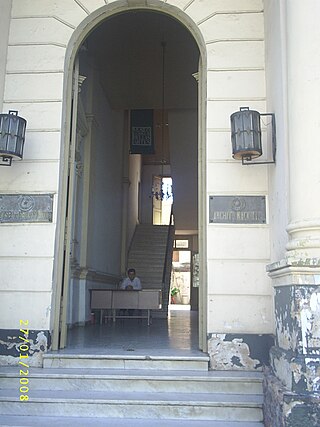
The National Museum of Fine Arts of Asunción, located on Mcal. Estigarribia and Iturbe St. in Asuncion, the capital city of Paraguay, displays over 650 works of art, paintings, sculptures, ceramics, prints, photographs, Paraguayan and international artists. As well as antique coins, furniture and various objects that belonged to its creator.

Federico Andahazi is an Argentine writer and psychologist.

Córdoba Avenue is one of the principal thoroughfares in Buenos Aires, Argentina.

María Amalia Lacroze de Fortabat was an Argentine executive and philanthropist.
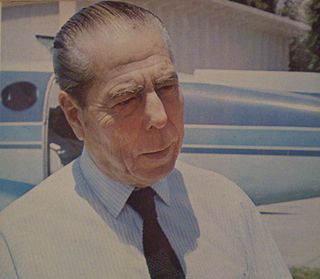
Alfredo Fortabat was a prominent Argentine industrialist.

The Buenos Aires Central Business District is the main commercial centre of Buenos Aires, Argentina, though not an official city ward. While the barrios of Puerto Madero and Retiro house important business complexes and modern high-rise architecture, the area traditionally known as Microcentro is located within San Nicolás and Monserrat, roughly coinciding with the area around the historic center of the Plaza de Mayo. The Microcentro has a wide concentration of offices, service companies and banks, and a large circulation of pedestrians on working days. Another name given to this unofficial barrio is La City, which refers more precisely to an even smaller sector within the Microcentro, where almost all the banking headquarters of the country are concentrated.

Avenida Leandro N. Alem is one of the principal thoroughfares in Buenos Aires, Argentina, and a commercial nerve center of the city's San Nicolás and Retiro districts. It joins Avenida del Libertador and Avenida Paseo Colón, its northern and southern continuation respectively.

The Bernasconi Institute is an architecturally-significant primary school in the Parque Patricios section of Buenos Aires.
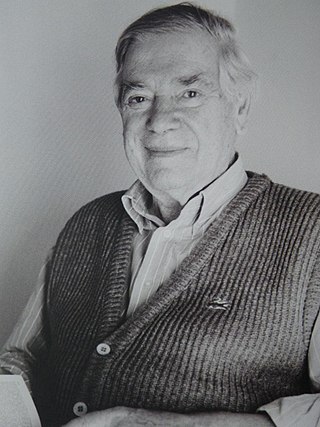
Leopoldo Presas (1915-2009) was an Argentine artist. He experienced different styles throughout his life. He had academic training and started as a figurative painter though he later turned into expressionism as well. He tried several mediums as oil, tempera, charcoal and pencil on different supports including canvas, paper, paperboard and newspaper. The themes of his works have been very extensive. The female figure was his main attraction, but he also did still lifes, landscapes, harbors, erotic paintings and some expressionist and controversial series as “The Pigs”, “The Kings of Putrefaction” and “The Christs”. He won the Konex Award in 1982 and 2012.

The Ernesto de la Cárcova Museum of Reproductions and Comparative Sculpture is located in the Puerto Madero ward of Buenos Aires, and is administered by the National University of Arts.

The first trams in Buenos Aires began operating in 1863 in what quickly became a vast network of tramways with the city being known as the "City of Trams" for having the highest tramway-to-population ratio in the world. In the 1920s, Buenos Aires had 875 km (544 mi) of tramways and 99 tram lines using 3000 carriages running throughout the city. By 1963, the vast majority of the network began to be dismantled, though some minor tram services continue in the city today.

Colección Patricia Phelps de Cisneros (CPPC) is a privately held Latin American art organization based in Venezuela and New York City founded by Patricia Phelps de Cisneros and Gustavo Cisneros.

Marcelo Pombo is an Argentine artist, born in December 28, 1959. He is a relevant figure in the Argentine artistic field. His work is in the collections of the Museo Nacional de Bellas Artes, the MALBA, Museo de Arte Latinoamericano de Buenos Aires, the Museo de Arte Moderno de Buenos Aires, the Museo Castagnino + macro, the Blanton Museum of Art of The University of Texas at Austin, among others.

Mondongo is an Argentine art collective founded in 1999 by three artists in Buenos Aires and named for the Latin American tripe stew, mondongo. They characteristically create realistic images with provocative content out of unusual materials.
Adrianus Hendrikus "Arie" “Jacques” Witjens was a Dutch painter known for his landscapes, cityscapes and figures of his native Netherlands and Argentina, where he lived after 1920.